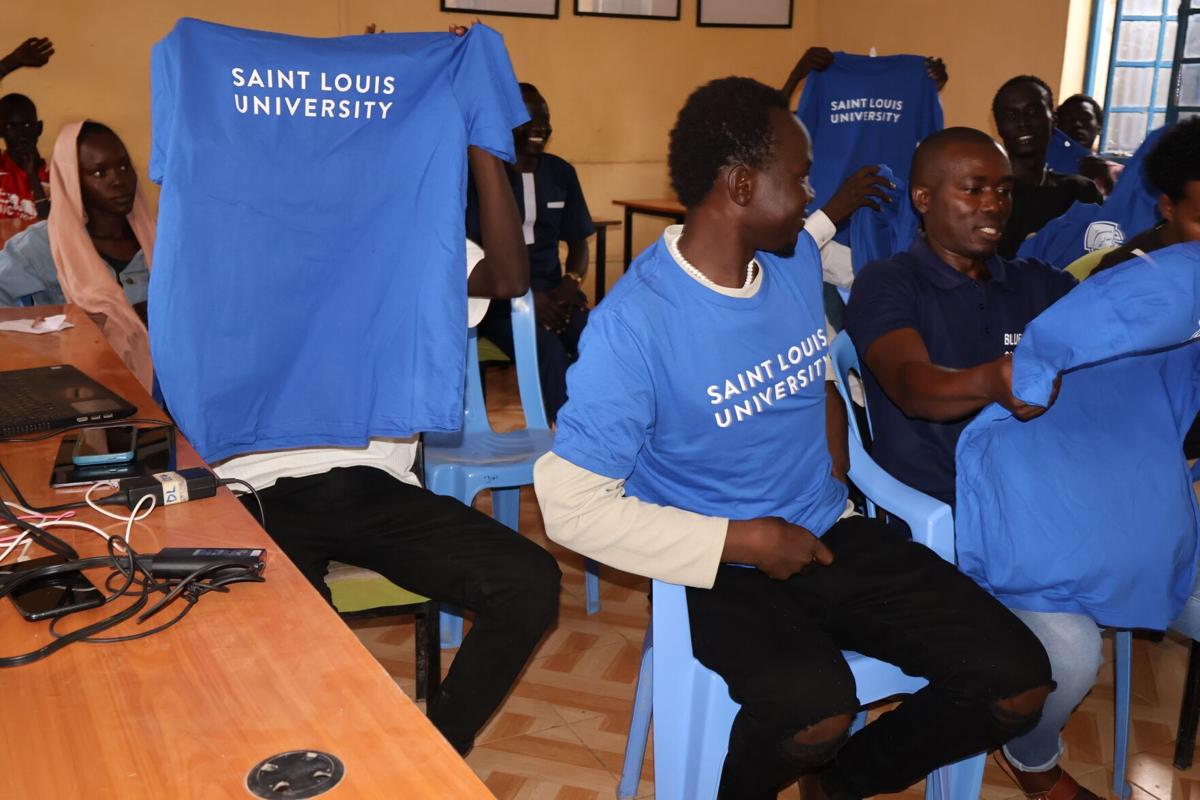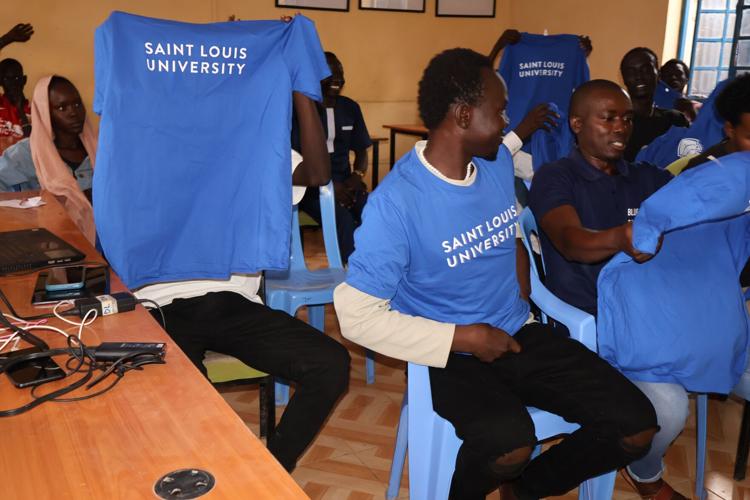ST. LOUIS — When Joya Uraizee was asked to teach an extra class at St. Louis University last semester, she didn’t hesitate, even though her schedule was already full.
Uraizee, an English professor, was eager to connect with young adults who lived on the other side of the world, in the Kakuma refugee camp in northwest Kenya.
“It was one of the most rewarding experiences I’ve had at SLU,” said Uraizee, who has taught for more than three decades. “It was humbling to see the level of enthusiasm of people who are bucking the odds.”
A St. Louis University partnership with Jesuit Worldwide Learning, a nonprofit based in Geneva, Switzerland, provides students who were displaced from their home countries by political unrest with a tuition-free SLU education. A bachelor’s degree, program organizers believe, is key to a more stable and self-sufficient life.
People are also reading…
SLU-JWL, which will graduate its first students in 2027, is an example of a broader effort to interrupt a cycle of poverty and disadvantage for a growing population of refugees. More than 120 million people worldwide — 40% of them children — have been forced to leave their homelands because of conflict or violence, double the number a decade ago, according to the United Nations High Commissioner for Refugees. Kakuma, one of the largest camps, houses 300,000 people.
Temporary settlements are often plagued by food insecurity, resource scarcity and overcrowding. Only 1 in 20 residents has access to higher education, according to the UN, which has set a goal that 15% of refugees will have a degree by 2030.
“We’re just part of this bigger initiative,” said Eboni Chism, the SLU-JWL program coordinator.
Jesuit Worldwide Learning, which formed in 2010, collaborates with about 20 universities and hosts education programs in 36 countries from the Middle East to South America. SLU joined last year.
JWL takes care of the logistics — making sure the technological infrastructure is in place at the camps’ learning centers and hiring local staff — and SLU provides professors and access to online resources.

Patricia Bass (second from left) and Eboni Chism (center, with backpack) pose with students at Kakuma refugee camp in Kenya. Bass and Chism are administrators with the SLU-JWL program at St. Louis University that offers a tuition-free path to a SLU bachelor's degree.
Making progress
Early on, one of the biggest challenges was getting students’ English up to speed, said Armando Borja, a director for academic partnerships at JWL. So they built an English-readiness curriculum. Language skills, critical thinking and digital literacy are a focus across the JWL partner institutions, he said.
“We all witness how the world is changing,” said Borja. “These communities need to find local solutions so they can restore livelihoods.”
Course content is handled “asynchronously”: Professors upload the syllabus and assignments, and students submit their papers or exams electronically. Classes connect weekly for Zoom office hours, usually at 7 a.m. in St. Louis to accommodate the time difference.
Uraizee’s English course was focused on reading, interpreting and composing essays. The class sampled pieces “from antiquity to modern day,” said Uraizee, wrapping up with Nigerian author Chimamanda Ngozi Adichie.
“The African writers resonated most, for obvious reasons,” said Uraizee.
In many ways, her students in Kenya were similar to the ones she teaches on SLU’s midtown campus. Some excelled; others struggled. Most everyone made progress. They often surprised her with their insights.
But there were plenty of differences between the groups. None of the refugee-camp students were native English speakers. They had been separated from relatives. Their K-12 education had been interrupted — in some cases, over and over.
The only access to Wi-Fi was in the camp’s learning center, during designated hours, so their study window was limited.
“It teaches you what we take for granted,” Uraizee said.

St. Louis University employees hike with students during a spring visit to Dzaleka refugee camp in Malawi. A partnership between SLU and Jesuit Worldwide Learning has allowed almost 60 students from settlements in Malawi and Kenya to work toward their bachelor's degrees.
‘A connection to others’
This month, a fourth cohort of about 20 SLU-JWL students joined 59 of their peers in the program. Most live in Kenya, but about 10 are in Malawi’s Dzaleka camp. ������Ƶ will earn bachelor’s degrees in general studies with a concentration in computer information systems.
“I’m not an IT person, but I thought maybe these are good skills to learn,” said Angela Abizera, 26, who enrolled in Malawi last year.
Abizera was 5 when she moved there from Rwanda with her mother and younger sister.
Though learning programming has been difficult, she anticipates it will give her marketable skills when she graduates in two years.
She was able to relocate to Saskatchewan, Canada, in the spring and is eyeing a post-grad career in project management, maybe in the United States. She knows she wants to make it to SLU’s campus for commencement.
“Most of us grew up thinking about life" outside the camp, Abizera said of the 50,000 residents of Dzaleka. “This program is a connection to others in a bigger space.”
When Zachariah Mark, 25, finished high school in the Kakuma, Kenya, settlement a few years ago, he looked for scholarships to continue his education. He couldn’t find any.
Then SLU-JWL was established. Participation in the program had an unexpected benefit: His only relative in Kakuma, a sister, had moved back to Sudan, where the rest of his family is.
Studying programming kept him busy — and his mind off of worrying about his loved ones. He has been encouraged to persevere by his classmates and professors, he said.
Mark works at a nonprofit in the camp, but he hopes his degree, which he expects to have in two years, will open up a new future for him.
If he can immigrate to the U.S. or Canada and find a better job, he will be able to send more money back to his family in Sudan.
“That’s what I am always dreaming of,” said Mark, who has lived in Kakuma for 12 years. “I’m really longing to move to another place.”
Post-Dispatch photographers capture tens of thousands of images and hours of footage every year. See some of their best work from July 2025 here.












